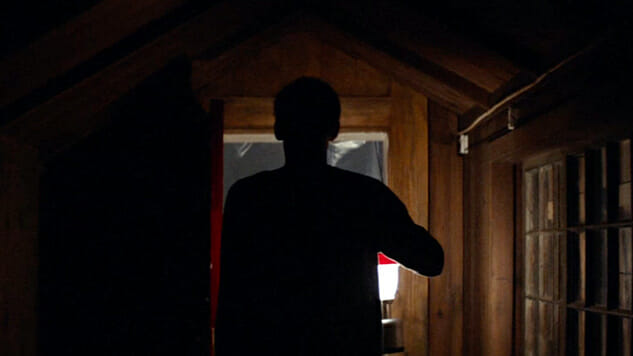It Comes at Night
(The Overlook Film Festival 2017 Review)

Within seconds, It Comes at Night haunts you. In the scene from which writer/director Trey Edward Shults says the rest of his script sprung, in the very first images of the film, an old man (David Pendleton) wheezes while covered, his skin festering, in boils. It’s clear: He isn’t long for this world. Shults and DP Drew Daniels hold his face in close-up as if they’re cradling him, trying to make his passing easier. Each successive detail is revealed with a carefulness that could only be described as some sort of deep, abiding empathy for the characters, any characters, Shults has on screen: first comes the man’s defeated face, his labored breathing, then the muffled voices of reassurance, telling him it’s OK to let go and that he’s loved. Then we see that the voices are muffled because they’re coming from gas masks. Then we watch as the people wearing gas masks roll the old man in a wheelbarrow out to the woods where they shoot him in the head and incinerate his corpse in a hole.
It Comes at Night is ostensibly a horror movie, moreso than Shults’s debut, Krisha, but even Krisha was more of a horror movie than most measured family dramas typically are. Perhaps knowing this, Shults calls It Comes at Night an atypical horror movie, but—it’s already obvious after only two of these—Shults makes horror movies to the extent that everything in them is laced with dread, and every situation suffocated with inevitability. For his sophomore film, adorned with a much larger budget than Krisha and cast with some real indie star power compared to his previous cast (of family members doing him a solid), Shults imagines a near future as could be expected from a somber flick like this. A “sickness” has ravaged the world and survival is all that matters for those still left. In order to keep their shit together enough to keep living, the small group of people in Shults’s film have to accept the same things the audience does: That important characters will die, tragedy will happen and the horror of life is about the pointlessness of resisting the tide of either.
Shults wrote the film, as he tells it, after his estranged father passed. The director was in Texas and in a bad frame of mind. So it makes sense that It Comes at Night is such an open wound of a watch, pained with regret and loss and the mundane ache of simply existing. Paul (Joel Edgerton) and Sarah (Carmen Ejogo) have a 17-year-old son, Travis (Kelvin Harrison Jr.), whom they live to protect—at least, they never stop reminding him as much, especially when he strays too far into the woods surrounding their isolated homestead, or cares too much about their dog, who we (characters and audience) know will probably get sick. Paul, a quiet man belying his short fuse, preaches the priorities of family, but his paranoia speaks for itself: Travis is everything that matters to his parents, and, like the son in The Road, he represents all that’s worth preserving after the world ends. He’ll bear their torch forward—to lose him would be to lose everything.
Of course, someone else shows up at the home, giving Shults a chance to introduce the audience to the family’s well-practiced emergency etiquette. They subdue, bludgeon and imprison the man at their door (Christopher Abbott), but after some interrogation, Paul’s convinced it’s worth trading water for food with the man and his family, and then, not long after, inviting them to cohabitate. Abbott plays Will, a seemingly blue collar fuck-up before the sickness who, along with Paul (former history teacher), apparently thrives in proving himself post-apocalypse by keeping his small family functionally alive. Both men aren’t able to do so, of course, but Shults doesn’t chock this up to a failure of masculinity, just to the exigencies of fate. Instead, Shults explores the idea of masculinity from the perspective of Travis, not a boy but not quite a man, who develops a harmless crush on Kim (Riley Keough), Will’s wife. Travis is a resolutely kind and thoughtful person, but Shults uses his private hormonal fantasies (shown in one instance as a dream of Kim coming into Travis’s room late at night) to explore what “living” actually is for a person his age. Is not-dying really living for someone who hasn’t really lived yet? For someone who hasn’t fallen in love or, presumably, had sex or started a family or been older than 17?